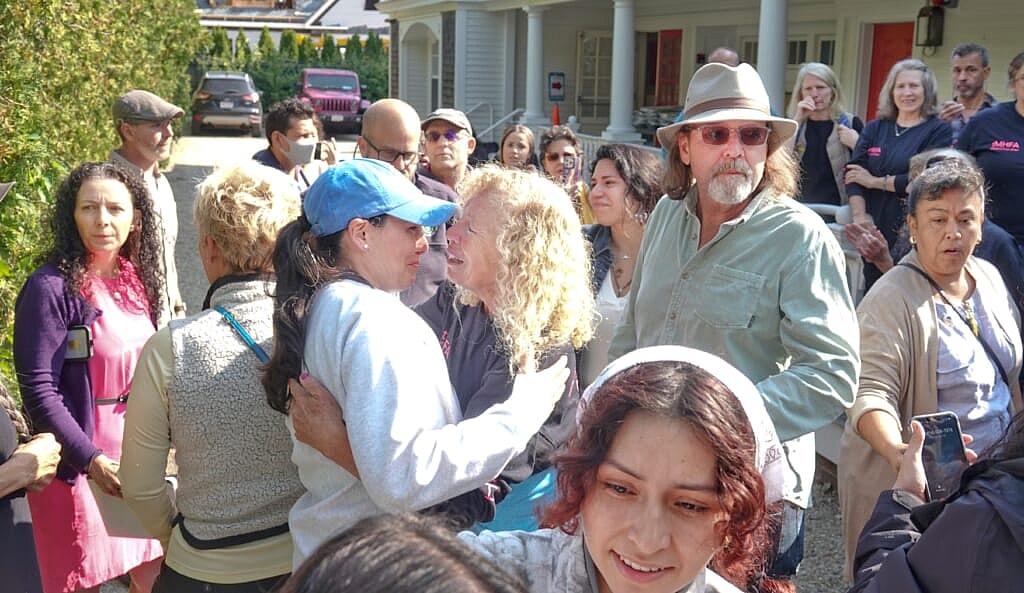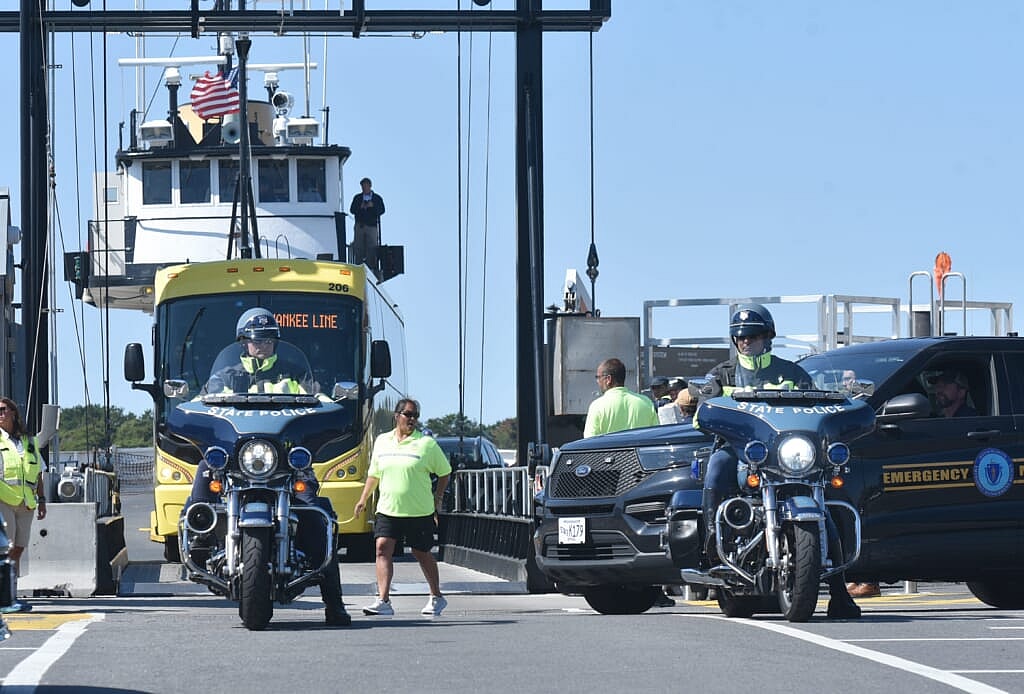No one knows why Florida Gov. Ron DeSantis flew 50 Venezuelan migrants to Martha’s Vineyard. He hasn’t disclosed why he chose that location. But what’s certain is the island’s isolation and wealth placed the migrants at greater risk of not receiving basic necessities.
DeSantis, a Republican with 2024 presidential aspirations, mirrored the actions of Texas’ GOP Gov. Greg Abbott who has bused thousands of migrants this year to New York and Washington, D.C. Some consider those cities to be liberal bastions. The same could be said of Martha’s Vineyard, a popular vacation spot for Hollywood’s elite and well-known Democrats such as the Obamas and Clintons.
But unlike large urban centers like Manhattan or the nation’s capital, Martha’s Vineyard lacks the infrastructure to aid tired, poor, huddled masses yearning to breathe free.

A DeSantis spokesperson released a statement that disclosed more information about the flight. “States like Massachusetts, New York and California will better facilitate the care of these individuals who they have invited into our country by incentivizing illegal immigration,” the statement read, according to NPR.
Boston or another mainland Massachusetts city might have been able to assist the Venezuelans. But DeSantis’ choice of an island about nine miles wide and 26 miles long proved particularly risky for the migrants.
On Martha’s Vineyard, there’s a dearth of food banks and 24-hour shelters. The island has just a handful of organizations equipped to help its small year-round population. A long-time resident describes the small island as mostly minimum wage permanent residents hosting and working for wealthy vacationers.
Martha’s Vineyard community services website lists only five food distribution options for the needy. And when the Venezulans arrived about 3:15 pm on Wednesday, Sept. 14, only one — Island Food Pantry — was open for business. It’s in Oak Bluffs, about seven miles from the airport, and it was scheduled to close within hours of the migrants’ arrival.
No one expected the migrants. None would have access to transportation to get to Oak Bluffs if they had even known such a resource existed. Additionally, Island Food Pantry, which is open only 10 hours a week, offers nonperishable food. The Venezuelans would need stoves and kitchens to prepare the food had they been able to get to the pantry.
“It was very precarious,” said Merrick Carreiro, the Food Equity Director at the Island Grown Initiative, which operates the Island Food Pantry. “We were on standby, but there was nothing we could do. It was all the restaurants who stepped up. We have no hot kitchen. We had a kitchen on standby. They were all taken care of for certain. But if we would have had to help long term, it would require every resource we have.”
The other food distribution options included FoodBasketsMV offering bags of non-perishables only on first and third Saturdays, a summer lunch program that ended Aug. 13, a family center pantry accessible by appointment only, and Serving Hands Food Distribution open the fourth Friday of every month for only one hour.

Nana Gyamfi, executive director of the Black Alliance for Just Immigration said Pres. Joe Biden needs to intervene. “The demonic duo — Governors Abbott and DeSantis — continues to abuse and deceive migrants seeking refuge and protection to score cheap political points with their pathetic base,” she said.
“Now is the time for the president and Democrats across the country to step up and provide sanctuary by delivering the funding needed to provide shelter, food, and basic necessities to these asylum-seekers.”
Caroline Hunter, a Martha’s Vineyard year-round resident, serves as one of the leads in the popular summertime Polar Bear morning water aerobic exercise on Inkwell Beach in Oak Bluffs.
She said despite the area’s reputation as an island of wealth and privilege, it is also home to regular working people and a place of work for others. “What people don’t understand is there are people who live here or who work here who don’t have multi-million dollar houses who are making minimum wage or below on tips,” Hunter explained. “This is a vacation community, but the infrastructure is supported by people who make minimum wage and regular wages.”
Jennifer B. DaSilva, a real estate agent with Point B Realty, told theGrio that the average price of a home on the island is “running between $1.3 to $1.5 million and in some towns it’s closer to $2 million.”
The island lacks housing options for the unsheltered. “We really don’t have any shelters,” Carreiro said. “What we have is only seasonal.”
During the winter, local hotels offer limited, short-term housing to people who are homeless. Whaling Church in Edgartown provides a similar service during the coldest months. St. Andrew’s Episcopal Church in Edgartown housed the migrants for two days before the state arranged to move them to mainland Massachusetts.
Skip Finley, former owner of WKYS in Washington, D.C. and a Martha’s Vineyard homeowner and resident added that the island is ill-equipped to meet the medical needs of migrants. In September — after many vacationers have departed — the six-town island has “one hospital with three critical care beds.”
Two days after their arrival, Massachusetts Gov. Charlie Baker transported the Venezuelans to Joint Base Cape Cod.
A statement published on the governor’s site said the move was necessary to provide the migrants with “access to food, shelter and essential services … accommodation, clothing and hygiene kits, nutrition, needs assessment, and access to health care, mental health, and crisis counseling services.”
The migrants subsequently have filed a class action lawsuit against the state of Florida and DeSantis in the U. S. District Court District of Massachusetts alleging that the governor devised a scheme to defraud migrants to “advance a political motive.” A Florida television reports that those migrants have received death threats.
The Venezuelans claim in the lawsuit that agents of DeSantis and Florida promised them work and a place to live. Boston-based Lawyers for Civil Rights and nonprofit organization Alianza Americas filed the lawsuit on behalf of the migrants alleging that, “when those induced onto the planes disembarked in Martha’s Vineyard, it turned out that no one was expecting their arrival, and uncertainty quickly ensued.”

The suit further alleges that Florida officials provided telephone numbers to the migrants and told them to call with any questions. However, lawyers representing the plaintiffs claim that once the plane landed in Massachusetts, the officials were “suddenly nowhere to be found and unreachable by phone.” The suit noted: “Destitute and stranded, the Plaintiffs were now even more vulnerable to precarious conditions.”
A Martha’s Vineyard first responder who requested anonymity said within six or seven hours of the migrants arrival, the community came with food, blankets and more items to help them.
She said the migrant crisis “opened the eyes to everybody here on the Vineyard should this happen again with 50 people that are declared homeless. It has now unearthed a need.”
TheGrio is FREE on your TV via Apple TV, Amazon Fire, Roku and Android TV. Also, please download theGrio mobile apps today!

